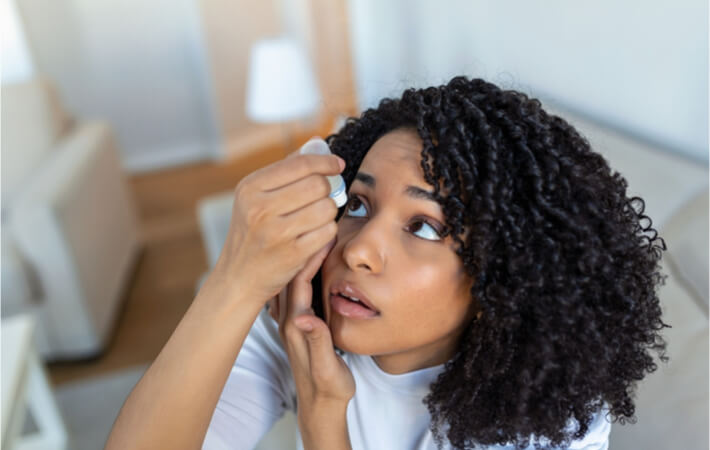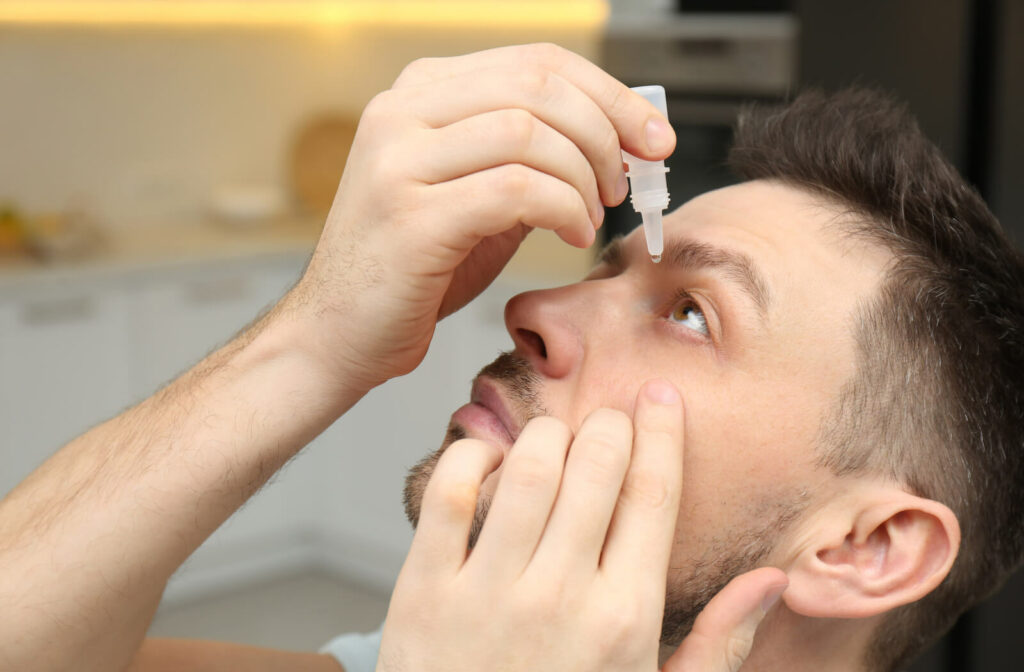A New Option for Presbyopia
Healthy vision is an essential part of your day. Vision changes, such as blurry near-vision caused by presbyopia, can significantly impact our lives. It can be frustrating if you can’t read a text because you’ve misplaced your reading glasses or contact lenses. Squinting to read a page or a price tag can cause headaches and eye fatigue.
After an eye exam to diagnose presbyopia, your optometrist may discuss multiple options for correcting your vision. One new option they may recommend is presbyopia eye drops.
What Is Presbyopia?
Presbyopia is a type of refractive error, a vision problem that affects close or distance vision. While other refractive errors are caused by the changing shape of the eye—either the cornea or eyeball surface, presbyopia is the result of the lens becoming less flexible.
The transparent lens changes shape to help direct light to the retina. When light is focused incorrectly, it causes blurry near vision. Presbyopia can occur in patients who’ve had life-long healthy vision, or it can happen alongside other refractive errors, including myopia, hyperopia, and astigmatism.
Changes to the lens focusing ability can begin in childhood. Still, most people don’t notice vision changes until their mid-40s or later. Since lens changes are a natural part of the aging process, everyone will eventually develop some degree of presbyopia.
Traditional Management for Presbyopia
There are multiple options for managing presbyopia. Over-the-counter methods include reading glasses, magnifying glasses, increasing font sizes for digital devices, and large-print books. Although none of these methods stop or prevent vision changes, they can make everyday tasks more manageable.
When visual ability decreases, prescription glasses or contact lenses can improve vision. Bifocals are a common prescription option if patients have multiple vision problems, such as presbyopia and myopia.
There are also surgical options, such as refractive surgery or intraocular lenses (IOLs). In some cases, only one eye (the dominant eye) is corrected. The one-eye approach, monovision, relies on one eye for close vision and the other for distance vision. Monovision can be challenging to adapt to but can also be more convenient than switching between 2 prescription eyeglasses or contacts.
Introducing Presbyopia Eye Drops
You don’t need to wait for presbyopia eye drops to be developed—they’re available by prescription now! Vuity, by Allergan, are the first FDA-approved presbyopia eye drops. Although Vuity is a relatively new treatment, it is widely available. If you’re a good candidate for Vuity, your optometrist can write a prescription and direct you to the nearest location.
Vuity eye drops don’t cure presbyopia, as changes caused by presbyopia are often progressive. However, Vuity can improve vision quality. Patients can forget their glasses or contact lenses and avoid the risks of surgical correction.
The recommended Vuity use is daily, with one drop in each eye. If patients use more than one topical eye treatment, they should space the application 5 minutes apart from Vuity eye drops. Vuity eye drops can begin working as early as 15 minutes after use and last up to 6 hours.
The drops contain a low dose of pilocarpine, a medication previously used to reduce eye pressure by shrinking the pupil. Pupils grow or shrink to adapt to light and focusing distance. Notably, our pupils shrink to see close objects. Vuity eye drops reduce pupil size to support the eye’s near-vision focusing.

Do Presbyopia Eye Drops Work?
There’s no such thing as a one-size-fits-all solution. Vuity eye drops can benefit many patients with presbyopia, but effectiveness can vary. As your eyes are one-of-a-kind, your eyes can have unique reactions or complications that interfere with effectiveness. Alternatively, you may not be a good candidate for Vuity because of eye health or an additional vision condition.
An appointment with your eye doctor can tell you whether Vuity is a good match for your eyes. At an eye exam, an optometrist can evaluate your prescription, eye health, and lifestyle to determine the benefits and risks of presbyopia eye drops.
Vuity can be effective for anyone with presbyopia, but the treatment is most effective in patients with lower prescriptions. Patients with higher prescriptions may see some improvement but still experience difficulties seeing finer details.
For example, a patient with low presbyopia, such as a +1.00 reading prescription, might be able to read the fine print of a medical bottle with ease after using Vuity. On the opposite end, a patient with a +4.25 reading prescription might easily read a standard printed page but have difficulty with fine print.
Who Is a Good Candidate for Vuity?
Only an optometrist or ophthalmologist can assess your eye health and determine if you’re a good candidate for Vuity eye drops. Notably, the treatment is prescription-only and is not available as an over-the-counter option.
Vuity eye drops can have side effects. The most common are eye redness and headaches. Additionally, because the medication causes pupil constriction, it can impact distance vision. The limited pupil dilation can also make activities in poor lighting challenging, including night driving.
Contact Us for Presbyopia Treatment
The first step in managing presbyopia is contacting your eye care team. We can take a closer look at your eye health and vision to determine if presbyopia eye drops may benefit you. Then, when you’re ready to discuss your eye care, talk to our team at Optical Illusions! We’re here to help you understand your options and help you meet your vision goals.



